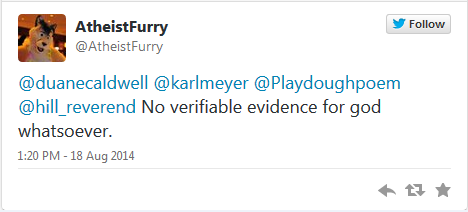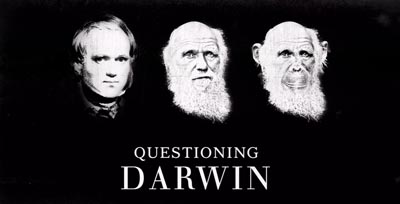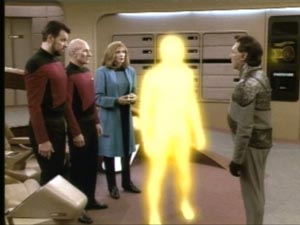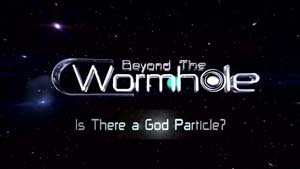The IMDB storyline synopsis of HBO’s recent1 documentary ends with the statement, “the film takes a balanced look at this 150-year-old debate.” It appears the film wants to take a balanced look, and they certainly had the opportunity, but if they were trying to achieve a balanced look, they failed miserably. Either the writers are so steeped in anti-Christian evolutionist doctrine that they couldn’t see their own bias, or they willfully withheld important data that is relevant to the discussion. Or perhaps it’s a bit of both. If they were seriously trying to present objections of those who “Question Darwin” why have they chosen to only present the case from the point of view of Bible believing Christians (of which I, of course, am one)? Such objections stem primarily from the fact that evolution is in direct contradiction to Biblical teaching. But that is not the only source of objections. Why did they not also present the case of scientists who do not believe in evolution from a scientific point of view? Surely the existence of scientific objections to Darwin is not a newsflash to the writers of a documentary on Darwin. There is an entire site highlighting the hundreds of scientists who have signed their names to the statement:
The site is Dissentfromdarwin.org and you can look up all the scientists who dissent yourself. Instead, the picture that is painted is that only fundamental, Bible believing Christians who, as the narrator tells us, “… believe their Bible is the Word of God, the ‘literal truth’ …”2, don’t believe in Darwinian evolution. That only Christians object to Darwin is clearly not the case and so that is a misrepresentation. The fact that they have omitted any reference to any scientific objections to Darwin points to what this documentary is really about: questioning Christians who question Darwin. Without speaking to those responsible for this production, one can only speculate as to their motives. But based on what they choose to include (statements from Christians without any investigation as to whether they might be true) and what they chose to omit (objections from scientists who disagree with Darwin’s theory), and the amount of time they spent explaining how Darwin arrived at his theory vs. the amount of time spent showing Christians who “question Darwin,” the motives seems clear: to present Christians as slightly irrational, slightly backwards, science rejecting people whose opinions should not be taken to seriously in this matter. Unfortunately, too often Christians provide ample fodder for this distorted view. A pastor3 is shown saying, “If in the bible I were to find a passage that says 2 + 2 = 5, I wouldn’t question what I’m reading in the Bible, I would believe it, accept it as true, and then do my best to work it out and understand it.” Brother, I understand what you’re saying. It is incumbent on the reader of the Bible to investigate further to work out apparent contradictions so as to resolve the contradiction and understand what the Biblical writer was saying. (Of course that clarification was not in the documentary.) For instance, Jesus while standing in the magnificent temple that took 46 years to build is quoted as saying, “Destroy this temple and I will raise it again in three days.” (John 2.19) This was clearly misunderstood by his audience, the Jews. (As it would be by anyone in that context who didn’t know Jesus.) Thankfully John, the writer of the gospel explains what he meant – that he was referring to his body. So Jesus was in essence saying if you kill me, I will physically raise this body and make it live again in 3 days, which is proof of my claims. A prediction and a promise he made good on that first Easter Sunday by his resurrection from the dead. So I understand the pastor to be underscoring the importance of working out apparent contradictions – though he chose, in my estimation, a poor example to illustrate the point. Arithmetic statements by nature and design leave little room for interpretation; and as such don’t illustrate the broad (though clear) range of meaning that verbal statements may convey, particularly when set in various contexts. So while his point is valid, it was used by this production to stereotype Christians as following blindly without a rational basis. As I state in What is Rational Faith Part 2, Christian Faith does not require a blind leap of faith. From there, the depiction of Christians gets worse, with a Professor accusing Christians of lying to children because they teach as truth what’s taught in the Bible; things that contradict evolution such as creation and a young earth. His exact statement was:
Clearly, instead of looking at scientists today who “Question Darwin” and how they view Darwin’s theory against today’s evidence, the writers chose to channel the accusations of the new atheists, who accuse Christians of child abuse for teaching them religion.5 Instead of looking at the scientific questions, they chose to look at how Christians interpret the Bible, apparently appalled that Christians can take Genesis “literally”6, and even more appalled that such an approach can be persuasive, noting:
That fact is only surprising (and disconcerting) to those who have bought into Darwinism lock, stock and barrel. While the program does an admirable job of correctly articulating Christian views – since they directly quote Christians, and even shows scenes from Ken Ham’s Creation Museum – still it is quite apparent that they mean to question those views. With their disdain for the views of those who doubt Darwin apparent, their refusal to show scientists who doubt Darwin gives the show a strong appearance of suppressing the evidence. This point is underscored by the fact that they had comments from former college professor Dr. Jobe Martin, who has published evidences against evolution in titles such as Incredible Creatures that Defy Evolution (I-III), but you don’t see any of his evidences; he provides history and commentary on Darwinism and its effects. Yet as philosopher of science and Intelligent Design advocate Dr. Stephen Meyer put it,
You won’t see any of the counter arguments to Darwin in this documentary however. In fact to the contrary, Darwin is presented as a hard working, state of the art (even if it is 19th century art) scientist who worked tirelessly to gather evidence for his theory. We are told of all the specimens he examined and the correspondences he had with other scientists. Darwin no doubt considered himself an objective researcher. (We’re supposed to believe that too.) We’re led to believe that his conclusions were valid based on all the research he did, however the documentary never bothers to mention or even question if the research that he conducted supported the conclusions he jumped to. The evidence suggests his research did not support his conclusions. The documentary makes clear however that he suffered greatly at the loss of his favored daughter Annie, and couldn’t understand why there should be evil in the world. Outspoken creationist, Ken Ham, president of Answers in Genesis graciously offers that if his theology professors had told him the source of evil was sin – not God, it may have changed his perspective. What is more likely the case, (since as the documentary tells us, Darwin once intended to be a clergyman) is that Darwin knew what the Bible said about the cause of evil, but didn’t care. It appears Darwin was determined to reject God in spite of the Bible’s explanation of evil in the world. The documentary further wants you to believe Darwin let science direct his thinking, not his (anti-God) theology; and that he reluctantly came to the conclusion that evolution is true. We are supposed to believe that he was objective about it all because he is quoted as saying: Continue Reading |
Is Faith Rational?
1. How can faith be rational, when faith means believing in something with no evidence? Or: 2. Is Faith/belief in God/belief in miracles compatible with science?
Starting with the second question – Faith in God and belief in miracles are compatible with science because faith and science are complimentary; not contradictory. There are questions that science is not equipped to handle. In such cases it doesn’t mean the item the question isn’t real; it simply means that science is incapable of answering the question. One such item, as author, scientist and theologian Alistair McGrath points out is this:
The answer clearly is no, science can’t answer it. And why not? Famous evolutionary biologist and historian of science Stephen Jay Gould suggests it’s because science and religion deal with different spheres of knowledge – “magisteria” as he called them – and they do not overlap. Science and religion are thus Non-Overlapping Magisteria (NOMA)[2] – so the one can not comment on the other. This formulation is close. Science can not see or measure the spiritual world, so it can not comment on it; but God, who is spirit (John 4.24) sees both the spiritual and material world, and thus can comment on both as an eye witness. Thus regarding the creation of the world, what you have in Genesis 1 is an eye witness account of the creation of the heavens and the earth in 6 days, and recorded as evidence – a testimony for all time. In passing, God as an eye witness to the creation is something science can not disprove. They can disagree with his testimony, (which they do) and disbelieve he even exists (which they do), but they can not prove he does not exist. Neither can they provide an eye witness to their version of creation – the big bang. They say believing God’s testimony can only be done by faith. Okay, so what is it when you believe George Washington was the first president? No one alive today was there to see it. All we have are testimonies. Is that not then, also faith? Yet no one asks scientists to prove George Washington was the first president, or prove that he existed. They take both to be true on the word of historians. Biblical testimony is no different. So why is faith in God’s written testimony any less rational than believing written testimonies that George Washington was the first president? If doubters of the Biblical account still want “proof” one can say creationists have higher quality “proof” than scientists – since in addition to scientific evidence, creationists have an eye witness account by a perfect witness while science merely has a of highly disputed theory – the big bang[3] which is backed by highly disputed evidence. Indeed the more we learn, the more the big bang is discredited. The universe is both too young for the theory to be true (for more on that see Saturn’s Rings are Young!) and recent discoveries like the Higgs Boson (the so called “god particle”) contradict the Big Bang theory. (For more on that see Testimony of the Higgs Boson.) So faith expressed as belief that God exists is rational; it is consistent with how we use “faith” in other spheres, and it is consistent with science. But some people don’t agree with that assessment for reasons that take us back to the first question: “How can faith be rational?” (implied: when science can’t see the evidence to prove it). This is perpetuated by a chorus of acolytes echoing the refrain:
What’s always amusing about these statements is the claim there is no evidence. Because the first thing they typically do is list the evidences then explain why they refuse to believe it. First off they want to eliminate the Bible as evidence because it’s well – the bible – a holy book. They never seem to realize they are committing the fallacy of a false analogy when they compare the Bible to a book of mythology or even other holy books. Unlike mythology and other “holy” books the Bible is full of verified history, fulfilled prophecy (we’ll note one below), known, verified historical people, and geographical locations that exist to this day that you can visit. That makes it a reliable source of information. In fact regarding reliability of the key section of the Bible that records the life, death and resurrection of Jesus – the New Testament – author and apologist Josh McDowell states:
|
||||||
Physical Evidence Jesus Existed
 Interior – St. Peter’s Basilica as painted by Giovanni Paolo Panini Interior – St. Peter’s Basilica as painted by Giovanni Paolo Panini |
Claims that there is no evidence that Jesus ever existed are simply untrue. Here’s why. |
In the companion article, Is Faith Rational, I note that many atheists claim:
You’ll find this objection from bloggers and authors2 alike among other skeptics. In response, I pointed out 4 items that are historical or archaeological evidence of the existence of Jesus to silence this claim. They are:
In the companion article there was not space to discuss these issues, so here is that discussion. Physical Evidences of Jesus’ Existence: First, please note these are presented as evidences not proofs. It’s very difficult to “prove” anything that happened in the past. However what we do have left from events in the past is evidences that the event occurred. The following are evidences that Jesus existed. 1. St Peter’s Basilica; Cathedrals and Churches all over the world. Before moving on – wait – I hear an atheist saying, based on that logic every pagan god for which a temple was built must also exist. Nice try. Let’s consider a pagan temple the Bible mentions – the temple of Artemis (Roman name: Diana) in the city of Ephesus. (Acts 19.27) and compare how people treat a mythical god with how they treat Jesus: – Is Artemis worshipped in any significant way today? Does she have thousands of temples/churches? – When swearing or cursing, does anyone swear by Artemis? Or use Artemis as an expletive? – Does anyone claim Artemis loved mankind enough to become incarnate, live on earth and redeem mankind from his own sin and folly? – Is time divided before and after the coming of Artemis? – Does Artemis have an animal marked on its body with her symbol that carried her in triumph as Jesus does? (John 12.12-15) Has her symbol inspired kings and armies like the Chi Rho did Constantine and his army? – Did Artemis prophesy anything that was fulfilled? Whether you love Jesus and revere him or despise him and use his name as an expletive, clearly the responses to Jesus has always been, and always will be qualitatively and quantitatively different from any other so called god. This makes both the worship of Jesus and his places of worship also qualitatively different. There is an entire fabric of evidences that St Peter’s Basilica becomes part of strengthening the entire case for the existence of Jesus. The temple of Artemis [or substitute any false god – Zeus, whatever] is a single thread that simply reminds man of his tendency to idolatry and folly. So please, don’t bother with the comparisons to other fallen temples. 2. Nails From the the Cross of Jesus While this find is helpful, what’s even more interesting is this: archeologist Simcha Jacobovici, noted that in the grave of the Caiaphas were two nails. He believes he has found the very nails used to affix Jesus to the cross, stating he has made: Continue Reading |
Atheists – Willfully Ignorant in their Looking Glass World
|
||||||
In the Looking Glass world of Alice in Wonderland, Tweedledee’s “logic” makes perfect sense. In the real world – it’s nonsense – or to be more precise – suffers from both a formal and a non-formal logical fallacy.2 Yet it makes perfect sense to Tweedledee and Tweedledum. In the same manner, the logic of atheists makes perfect sense to them in their looking glass world where they protect themselves from the truth; they can’t see anything wrong with it – yet it is clear to others it is as fallacious as the flawed logic of Tweedledee and Tweedledum. When difficult questions are put to atheists about the nature of reality for which the atheistic worldview has no answer, atheists (and evolutionists alike) throw out fine sounding arguments. And like the Looking Glass characters, their answers have the form of validity, but upon close examination it is apparent their arguments are as fallacious as the logic used by the Tweedles. Let me give a couple of examples. Consider the question – Why is there something rather than nothing? For the Christian, there’s an easy answer: In the beginning, God created the heavens and the earth (Gen 1.1). For philosophers, it is a very deep philosophical question. In fact Martin Rees, cosmologist, astrophysicist and astronomer royal calls it the “preeminent mystery.”3 Such a formulation does not affirm the Christian worldview, but neither is it overtly antagonistic. But for particle physicist, skeptic (of the supernatural) and atheist Victor Stenger that question is:
|
||||||
GULO and other Irrational Atheist Arguments – Part 2
7 Popular, but Fallacious Arguments by Atheists
 Evolution uses circular arguments to support the supposition that dinosaurs became extinct 65 million years ago. Evolution uses circular arguments to support the supposition that dinosaurs became extinct 65 million years ago. |
More arguments used by atheists that upon inspection are clearly wrong and fail to support atheistic or evolutionary doctrine. |
|||
| In Part 1 of this article I discussed problems 1 and 2: GULO and LUCA respectively and why they are irrational arguments. In closing the discussion on LUCA I noted that evolutionists and atheists are blind to evidence of intelligent design. This leads into our next irrational argument: 3. “There’s no evidence”Atheists and Evolutionists alike tend to use this argument for anything they don’t believe. They don’t believe in God, so they say there’s no evidence of God. They don’t believe in intelligent design, so they say there’s no evidence for it. They don’t believe in miracles, so they say there’s no evidence of them. This argument is particularly common in the twitter world: 
Notice the above person states no “verifiable” evidence. This means there is no evidence you can present that will meet his standard for “verifiable.” (An illicit shifting of the burden of proof.) The problem with saying “there’s no evidence” is you must then explain away all the sites with evidence – like this one, or creation.com or answersingenesis.org or a host of other sites and books (including the Bible) which provide the evidence against evolution and for God and intelligent design which they claim doesn’t exist. Brian Auten provides a list of such sites on his Apologetics315 here. In light of the overwhelming evidence, one is tempted to say they’re simply lying. After all, it’s one thing to say the evidence is misunderstood; quite another to say that none exists. But there are at least two other dynamics likely at play here.
Part of the light of the gospel is the fact that God exists and God created. The god of this age – Satan – doesn’t want you to believe that; so those following atheistic or evolutionary beliefs have unwittingly fallen for yet another lie of the father of the lies, which keeps them captive to false philosophies. We must pray for such people in hopes that “they will come to their senses and escape from the trap of the devil, who has taken them captive to do his will.” (2 Tim 2.26)
4. “Dinosaur fossils are millions of years old “Everyone knows what wiped out the dinosaurs. Sixty five million years ago it came from outer space.”1 So begins a documentary entitled “What really killed the dinosaurs?” It perpetuates the supposed date which scientists have settled on as the date for when the dinosaurs became extinct: 65 million years ago. Scientists also use fossils to verify that date – a date which supports an old earth theory of earth history instead of a young one. But as Kent Hovind is fond of pointing out the fossil evidence argument is a circular one. He relates the story of a visit he took with his daughter to the School of Mines & Technology Museum of Geology, Rapid City S.D. His daughter asks the tour guide” Continue Reading |
||||
GULO and other Irrational Atheist Arguments – Part 1
7 Popular, but Fallacious Arguments used by Atheists
For those wondering why the apostle cast out a demon providing free advertisement for him, the answer is simple: God’s people are forbidden from having anything to do with demons2 – even if what they do is initially helpful. The amazing thing to Christians is that Paul put up so long with it. I mention it because I likewise feel troubled by the recurring contention of Atheists that the pseudo-gene known as GULO or GLO proves common descent. So let me
1. “GULO proves Evolution” What is GULO and how does it supposedly prove evolution?
L-gulonolactone oxidase – commonly known as GULO – is a gene designed to synthesize vitamin C from glucose or galactose, but in some groups of animals, the GULO gene does function in that manner, and so it is given the label of “pseudogene.”4 Additionally, the gene is “broken” reportedly in the same place in multiple species resulting in a loss of the ability to synthesize vitamin C. Humans are not able to synthesize vitamin C. Neither are guinea pigs, chimpanzees and several species of monkeys along with some species of birds, bats and fish. Evolutionists look at these facts and conclude that the only way the gene could have broken in the sample place is if the gene of a common ancestor became broken, and that same broken gene was then inherited by subsequent descendants. Thus to their way of thinking the only way this broken gene would show up in multiple species is if it started in a common ancestor. Recent evidence refutes this conclusion, and the attempts by evolutionists to salvage their conclusion makes matters worse – Continue Reading |
||||||
Detecting the Doctrines of Demons
Honest atheists will tell you there is no purpose or meaning to life, no hope of an after life and all your thoughts, feelings and desires are merely the result of the electro-chemical reactions in your brain and thus are ultimately meaningless. As one such honest atheist put it:
Or as Cornell University atheist William Provine famously stated:
Knowing that the atheistic worldview can not support any sort of future meaning, hope or purpose does not stop some of them from trying to inject these into atheistic life and thought through any number of means. One such means is entertainment. Case in point – an episode of Star Trek: the Next Generation, titled “Transfigurations” which posits that man may be able to evolve into a higher spiritual state. Here’s how the guest character explains it:
Thus the decidedly atheistic Star Trek series displays a curiously messianic figure who has been exhibiting messianic attributes (like healing) just before he is seen completing another messianic miracle: the transfiguration. For those not familiar with the biblical account from which this is clearly drawn, here is the salient portion:
One is left to ponder – what is an atheistic series like Star Trek: the Next Generation doing displaying an episode with Christian themes? The answer lies in the explanation given – “a wonderful evolutionary change.” There it is – the atheistic hope. So once again, it is the theory of evolution that comes to the rescue. Just as it has rescued atheists from having absolutely no explanation for the origin of life, now they are hoping it will provide them with hope for a spiritual future for mankind; a hope that professor Provine has explained and clearly stated that atheists have no business expecting or hoping for. And while it may seem curious for an atheistic series like Star Trek to focus on such overtly Christian themes, once you hear the explanation, it’s supposed to all make sense. But there’s still a problem – a problem that becomes obvious – once you understand the recurring lie of the enemy. Before going there, a word on the historical account. |
||||||
Testimony of the Higgs Boson
Since he does it so well, I’m going to let Morgan Freeman set this up:
According to scientists, the Higgs boson is what gives particles mass. Of course without mass neither the universe, nor life as we know it could exist. Thus the name the ‘God’ particle, at least in some people’s mind – fits since nothing would exist without it. Scientists prefer to call it the Higgs boson or the Higgs particle, but of course for those who report the stories, the ‘God’ particle is a much more catchy headline and moniker – so it has stuck. Purists however will tell you that the name came about when Nobel Prize winner Leon Lederman wanted to name his book about the particle ‘The God – – – – [expletive deleted] Particle‘ – because no one could find it at the time – but his editor talked him into calling it the ‘God’ particle.2 Let’s let Morgan continue:
And thus the Higgs boson – the so called ‘God’ particle – is introduced. The episode goes on to point out problems now that they’ve made the discovery – that in order to eliminate anomalies and make the theory work – there must be not one, but five Higgs types of Higgs bosons. But that’s a simple matter of further discovery – not what I want to discuss here. Of greater interest is a finding that the Higgs boson is in conflict with the standard, universally accepted model of where the universe came from – The Big Bang. And thus we see another problem for the Big Bang theory. I say “another” because the Big Bang theory of course has a number of problems- such as flatness problem, the monopole magnet problem, and the horizon problem4 among others. Since this post isn’t on the technical details and problems of the Big Bang, let me suffice it by saying that the Big Bang has a number of show stopping issues, many of which were supposedly solved by Alan Guth’s theory of Cosmic inflation – at lest these problems that I’ve mentioned. Make two mental notes here:
Let’s move on to the latest Discovery. The latest tests with the Higgs boson indicate that the Higgs is Continue Reading |
||||||
Bombs, design and Spiritual Blindness
 |
Where is the outrage over hundreds of bombs raining down on Israeli cities, and the oft stated intentions of Muslim radicals to wipe Israel off the face of the earth? |
How long would the United States tolerate terrorists bombing its capital Washington DC, or its financial center New York City? Well we already know the answer don’t we? When terrorists attacked the US on September 11, 2001 the US response was swift. On September 20, 2001 President George W. Bush declared a “War on Terror” and later vowed to capture the mastermind Osama bin Laden “dead or alive.”1 That sentiment resonated with the American voters and helped win him a second term. That was after one attack on a single day with four targets.
What would the response be if terrorists were raining down bombs by the hundreds over months and years?2 What if they regularly made statements to totally eradicate every last American? I submit the answer is obvious. Americans wouldn’t tolerate it, and would demand swift, decisive military action to eliminate the threat – as President Bush initiated against the war on terror. There would be no tolerance for hiding in bomb shelters nor a felt need to moderate the force used against the terrorists.
Why then does anyone have a problem with Israel’s actions to defend itself? Why the continued calls for Israel to back down on their defensese? Why the sympathetic articles towards the terrorist group Hamas by liberal papers like the The Washington Post? Why is the world, (not to mention her ally the United States), not rallying behind Israel supporting her 150%,? The answer is easy: As one Israeli Christian put it,
“…it is the very height of hypocrisy that the West, which sheds crocodile tears over the horrors faced by Christians in Iraq and Syria, then turns around and condemns Israel for defending its people against the very same horrors.”3
But why the hypocrisy? Another easy answer: Spiritual Blindness. The type of blindness that prevented the Pharisees from acknowledging that Jesus had healed a man born blind in fulfillment of prophecy and thus both demonstrating and asserting that he is the messiah.4
It’s the same type of spiritual blindness that keeps evolutionists from seeing all the evidences of design in God’s creation; that keeps big bang supporters from recognizing that you can not get a universe out of nothing; and the same type of blindness that keeps atheists who are angry with God from seeing that anger or disappointment over some evil in the world does not mean that God does not exist.
Scripture records Jesus reaction on one occasion to the stubbornness and spiritual blindness of those who refuse to answer even a simple a question lest their error and hypocrisy be revealed:
He looked around at them in anger and, deeply distressed at their stubborn hearts…
Mark 3.5
If you deny Israel’s right of self defense, or obvious things like the fact that universes don’t pop out of nothing, don’t be surprised to get this reaction from a Christian.
Let me close with a reminder to Christians:
Pray for the peace of Jerusalem: May those who love you be secure.
Ps 122.6
Duane Caldwell | posted 7/31/2014 | Print format
1 Bush pledges to get bin Laden, dead or alive USAToday 12/14/2001
http://usatoday30.usatoday.com/news/sept11/2001/12/14/bush-binladen.htm
2 Hamas has showed Israel with hundreds of bombs with the intent to kill as many as possible – regarless of whether civilian, women or children and have targeted the capital Jerusalem, and the financial center Tel Aviv.
Hamas rockets reach Jerusalem and Tel Aviv Jerusalem Post 7/8/2014http://www.jpost.com/Operation-Protective-Edge/Iron-Dome-intercepts-second-rocket-over-greater-Tel-Aviv-361994
This tweet puts the number of rockets fired by Hamas at Israel at 3034 since the start of Operation Protective Edge
https://twitter.com/israelunderfire/statuses/495544304723451904
3 Israeli Christian Spokesman: Enough With Western Hypocrisy! Israel Today 7/30/2014
http://www.israeltoday.co.il/Default.aspx?tabid=178&nid=24801
4 John 9.1-41; Isaiah 42.1-7
Does where you’re born determine what you believe?
 |
Is your faith merely a product of your location and culture? |
Here’s a conceit that atheists allow themselves that would be amusing if it weren’t so utterly false and insulting to everyone who’s not an atheist. It goes something like this:
If you believe in God, you’re a slave to beliefs imposed upon you in your youth. You’re a slave to the beliefs from the area of the world and culture you grew up with. On the other hand if you’re an atheist, you’re not subject to such imposition, and have freed yourself of such beliefs. Of course they don’t put it that way, they usually phrase it something like this:
Dear theists: If you were born in India you’d be Hindu if you were born in Iraq you’d be Muslim if you were born… I’d still be an atheist
— Atheist World (@AtheistWorld)
August 29, 2013
Did you catch the conceit? Apparently, atheists believe they are somehow superior and they and only they have the power to choose what they believe. They thereby implicitly state that theists are weak and ignorant; and explicitly state theists are slaves to whatever belief was imposed upon them while they were growing up. What remains unanswered is for atheists who grew up in a family with theistic beliefs, why they too didn’t remain a slave to such beliefs?
Others1 have addressed this topic, but let me try to succinctly add some glaring issues with this argument:
First off it’s logically fallacious, falling to the logical fallacy of Special Pleading -where the arguer finds fault with a particular proposition or situation; yet they themselves fit the proposition or situation. Nonetheless they believe their conclusion does not apply to them – and provide no reason for believing themselves to be the exception. This is a classic case of irrational special pleading.
Secondly, many atheists continue to believe that Continue Reading






